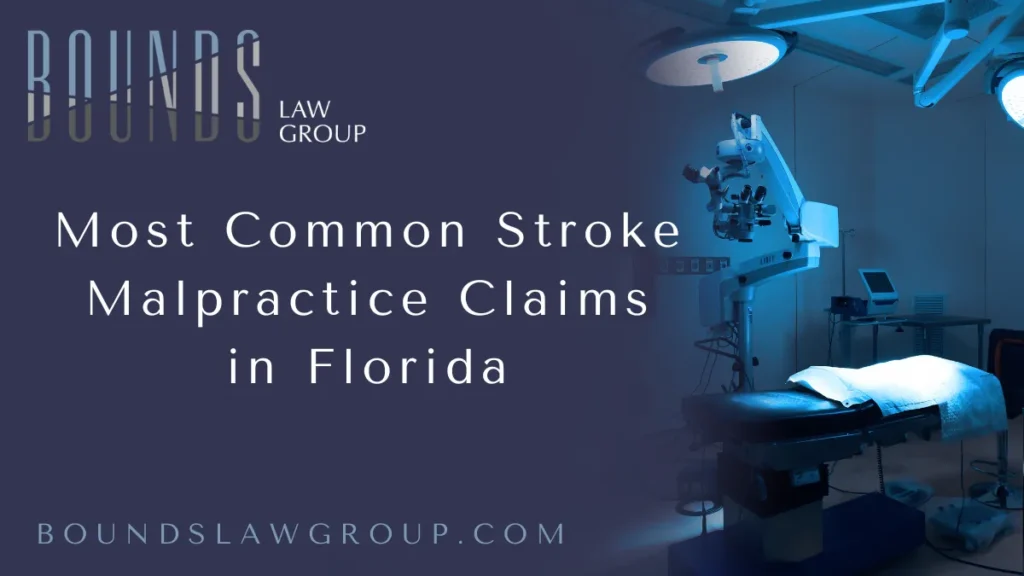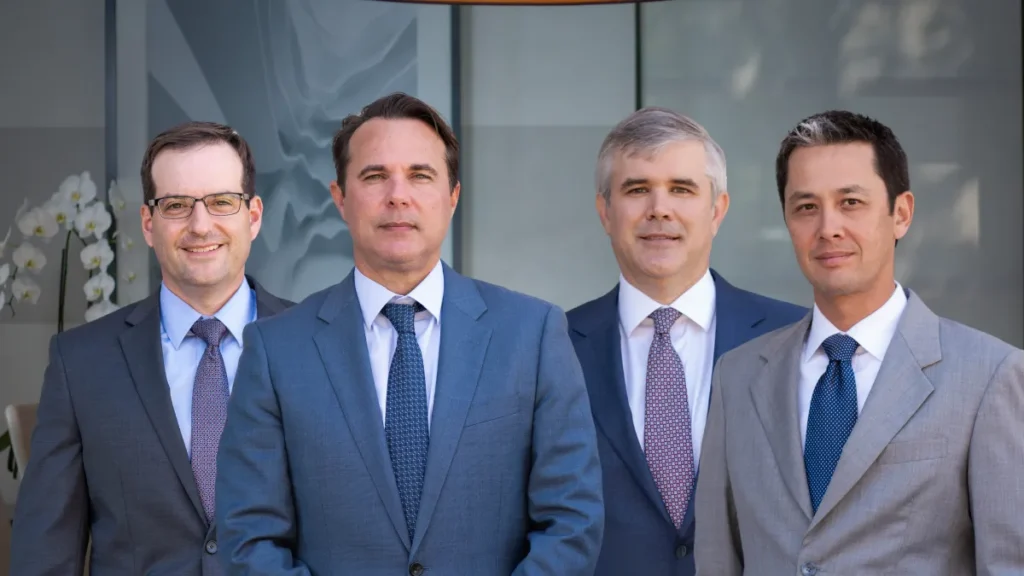
When a stroke occurs, every second counts. Proper diagnosis and timely treatment are critical to prevent lifelong disability or death. Unfortunately, medical providers sometimes fail to meet the required standard of care. At Bounds Law Group, we represent victims and families harmed by negligent care in stroke malpractice claims in Florida. Our goal is to hold negligent providers accountable and secure the compensation our clients deserve.
This comprehensive overview outlines the most common types of stroke malpractice claims in Florida so you can recognize when medical negligence may have occurred and understand your legal options.
Contact us today through our free case evaluation form or call 877-644-5122.
Stroke Malpractice Claims in Florida
A stroke malpractice claim arises when healthcare providers fail to promptly diagnose, treat, or manage a stroke, causing unnecessary harm. Florida, where stroke remains a leading cause of disability and death, sees many such claims.
Medical professionals are expected to recognize both ischemic strokes (caused by blood clots) and hemorrhagic strokes (caused by bleeding in the brain) and to administer appropriate treatment, including clot-busting drugs like tPA, within narrow time frames. When these expectations are unmet due to negligence or errors, the consequences for patients can be devastating.
Failure to Diagnose a Stroke in the Emergency Room
One of the most frequent stroke malpractice claims in Florida involves the failure to diagnose stroke symptoms promptly in emergency settings. Emergency rooms are often the first place stroke victims seek help, but many patients are sent home without proper evaluation.
Common misdiagnoses include:
- Migraines
- Inner ear disorders (vertigo)
- Seizures
- Intoxication
- Low blood sugar (hypoglycemia)
Emergency physicians may misread initial imaging like CT scans or fail to order an MRI when necessary. Ignoring neurological signs or dismissing symptoms as benign delays treatment, resulting in catastrophic brain damage or death. At Bounds Law Group, we have witnessed the severe consequences of missed diagnoses.
Delay in Administering tPA or Other Critical Treatments
For ischemic strokes, administering tPA (tissue plasminogen activator) within a 3- to 4.5-hour window after symptoms start is the medical standard. This clot-dissolving drug significantly improves outcomes if given promptly.
Delays leading to malpractice claims include:
- Slow triage processes in hospitals
- Delayed imaging or test results
- Waiting on unnecessary specialist consultations
- Poor coordination between medical teams
Such delays cause irreparable brain injury as vital minutes are lost. Patients and families suffer needlessly due to hospital inefficiencies and negligence.

Failure to Recognize Stroke in Young Patients
While many associate stroke with older adults, younger people—including those in their 20s and 30s—can also suffer strokes. Unfortunately, medical providers sometimes dismiss symptoms in younger patients as anxiety, migraines, drug use, or fatigue.
This age-based bias leads to dangerous misdiagnosis and failure to provide timely care. At Bounds Law Group, we aggressively pursue malpractice claims where youth contributed to negligence, ensuring younger victims receive justice.
Inadequate Stroke Workup and Imaging
Timely, accurate imaging is essential for stroke diagnosis and treatment planning. The standard typically involves an initial CT scan followed by MRI if necessary. Many malpractice claims arise from:
- Delayed or omitted imaging
- Misinterpretation of scans by radiologists
- Failure to order advanced imaging when symptoms persist
Neglecting this diagnostic step breaches the standard of care and may delay life-saving treatment.
Mismanagement During Hospital Stay
Proper inpatient care following a stroke is crucial. Hospitals must monitor for complications such as brain swelling, hemorrhagic transformation, and unstable blood pressure.
Common negligent acts include:
- Failing to monitor neurological status adequately
- Poor blood pressure control
- Delayed surgical interventions for bleeding strokes
- Allowing prolonged low oxygen levels or other preventable complications
These lapses after diagnosis often worsen outcomes and increase permanent disability.
Negligent Post-Stroke Rehabilitation and Follow-Up
Effective rehabilitation begins early and involves physical, occupational, and speech therapies tailored to the patient’s needs. Malpractice may occur if:
- Rehabilitation referrals are delayed or denied
- Secondary complications (blood clots, pneumonia) are ignored
- Communication breaks down between specialists and primary care
Poor post-stroke care severely impacts recovery and quality of life, making it a critical focus in many stroke malpractice claims in Florida.
Stroke Following Medical Procedure or Surgery
Some strokes result from complications during surgery or medical procedures, known as perioperative strokes. These may occur due to:
- Improper anesthesia management
- Failure to manage blood-thinning medications properly
- Clots dislodged during heart or carotid artery procedures
If medical teams fail to prevent these risks or ignore warning signs, affected patients have grounds for malpractice claims.
Failure to Educate Patients and Families on Stroke Warning Signs and Prevention
A frequently overlooked source of malpractice involves inadequate education of patients and their families about stroke warning signs and prevention strategies. Medical providers must inform high-risk patients—such as those with hypertension, diabetes, or atrial fibrillation—about symptoms like sudden weakness, confusion, or speech difficulties.
Moreover, patients need guidance on lifestyle changes and medication adherence to reduce recurrent stroke risk. Failing to provide this education jeopardizes patient safety and may lead to delayed treatment in subsequent strokes, causing further harm.
At Bounds Law Group, we investigate all facets of care, including whether proper education and discharge instructions were provided.

Do You Have a Stroke Malpractice Case in Florida?
If you or a loved one has suffered serious injury or death due to delayed or improper stroke care, you deserve justice. Our experienced team at Bounds Law Group will:
- Thoroughly review your medical records
- Consult with top stroke and neurology experts
- Identify where the standard of care was breached
- Fight to recover full compensation for medical bills, pain and suffering, lost wages, and more
We understand how overwhelming it is to cope with the aftermath of stroke malpractice. Let us guide you through the legal process with compassion and strength.
Take Action Now
Time is critical—not only in stroke treatment but also in protecting your right to legal recourse. If you suspect stroke malpractice in Florida, do not hesitate.
Complete our free case evaluation form or call us now at 877-644-5122 to speak with a trusted Florida stroke malpractice attorney today.
Sources
- American Heart Association – Stroke Guidelines
Comprehensive clinical standards for stroke care, including treatment windows and protocols.
https://www.heart.org - National Institutes of Health (NIH) – Stroke Information
Authoritative resource on stroke types, symptoms, and the importance of rapid treatment.
https://www.ninds.nih.gov/health-information/disorders/stroke - Florida Department of Health – Stroke Care in Florida
State-level data on stroke incidence, treatment outcomes, and healthcare facility performance.
https://www.floridahealth.gov

